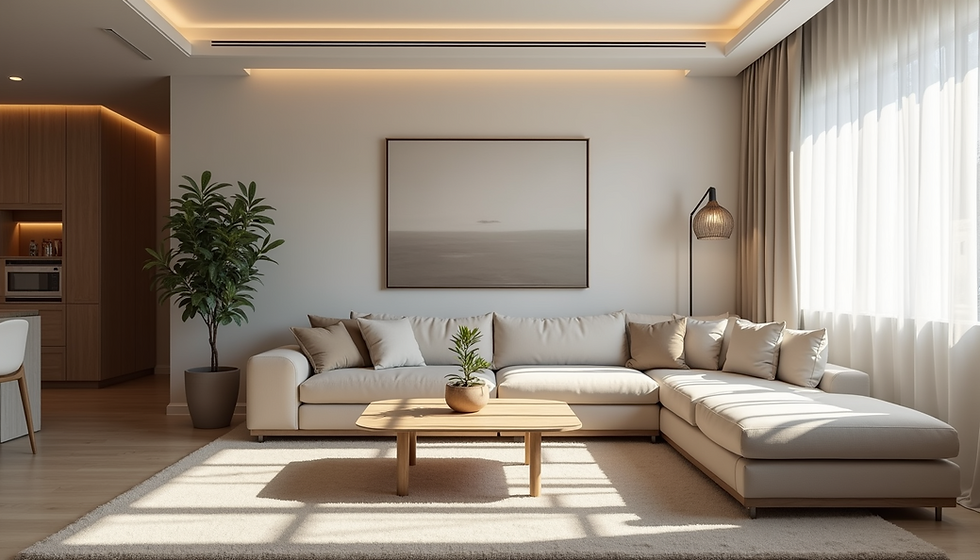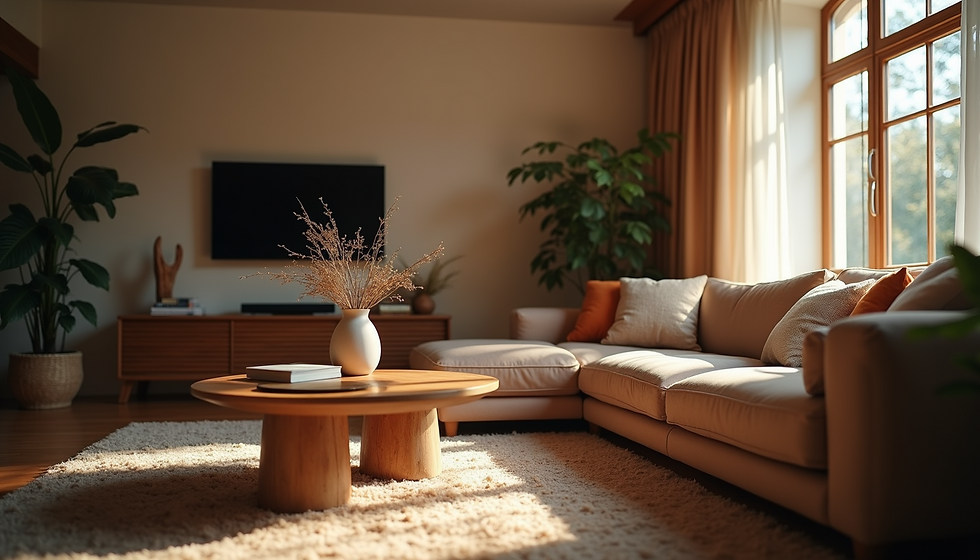Exploring Natural Stone Options for Benchtops: A Comprehensive Guide
- Alenka Dirnbek

- Feb 24, 2024
- 5 min read
Updated: Aug 13, 2024
When it comes to designing a kitchen, choosing the right benchtop material is a crucial decision. Natural stones are a popular choice for kitchen benchtops, offering durability, elegance, and a timeless appeal. In this guide, we'll explore various natural stone options for kitchen benchtops, highlighting their pros and cons to help you make an informed decision.

Granite - The Timeless Classic
Pros
Durability: Granite is known for its exceptional hardness and resistance to scratches and heat.
Aesthetic Appeal: Available in a wide range of colours and patterns, granite adds a luxurious touch to any kitchen.
Value Addition: Granite benchtops can increase the resale value of your home.
Cons
Cost: Granite can be relatively expensive compared to other natural stones.
Maintenance: Requires periodic sealing to prevent staining and to maintain its lustre.
Weight: Being heavy, installation may require additional structural support.

Granite (Colonial Gold): Image credit - Finestone Marble & Granite
Marble - Timeless Elegance with a Softer Touch
Pros
Elegance: Marble's unique veining and luxurious appearance make it a favourite for high-end kitchens. Marble's unique veining and luxurious appearance make it a favourite for high-end kitchens. Marble, renowned for its timeless beauty, presents a diverse palette of colours. From the iconic classic white Carrara with its subtle veining to more exotic options, marble offers a luxurious spectrum of possibilities for your spaces. The natural variations and unique patterns in marble bring a touch of opulence and sophistication, making it a beloved choice in interior design. Whether you prefer the understated elegance of lighter tones or the dramatic flair of darker hues, marble adds a distinctive charm to any room, elevating the overall aesthetic of your design projects.
Cool Surface: Marble stays cooler than many other stones, making it ideal for baking and pastry preparation.
Aesthetic Variety: Available in various colours, from classic white Carrara to more exotic options.
Cons
Porosity: Marble is prone to staining, and acidic substances can etch the surface.
Scratch Sensitivity: Softer than granite, marble is more susceptible to scratches.
Regular Maintenance: Requires sealing and careful cleaning to preserve its beauty.
Cost: Marble is expensive compared to other natural stones. Marble's exquisite beauty, coupled with its unique veining and timeless appeal, contributes to its higher price compared to other natural stones, making it a premium choice for those seeking luxury in their design.

Marble (Calacatta Borghini): Image credit - Finestone Marble & Granite
Quartzite - The Durable Alternative
Pros
Durability: Quartzite is one of the hardest natural stones, offering excellent resistance to scratches and heat.
Low Maintenance: Unlike marble, quartzite is less porous, requiring less frequent sealing.
Variety: Available in a broad range of colours and patterns, mimicking the look of marble or granite.
Cons
Cost: Quartzite can be on the higher end of the price spectrum. It's important to note that within each category (quartzite and marble), there is a wide range of prices depending on the specific characteristics of the stone. Generally, Marble can be more expensive than Quartzite, but prices vary based on factors like rarity, quality, and region of origin.
Limited Availability: Certain colours and patterns may be harder to find.

Quartzite (Pink Patagonia): Image credit - Finestone Marble & Granite
Soapstone - The Understated Beauty
Pros
Heat Resistance: Soapstone is known for its ability to absorb, retain, and radiate heat.
Aesthetic Appeal: Develops a natural patina over time, adding character to your kitchen.
Stain Resistance: Resistant to stains and relatively low maintenance.
Cons
Scratches: Soapstone is softer and more prone to scratches, though these can be sanded out.
Limited Colour Options: Predominantly available in shades of grey, green, or black.

Soapstone : Image credit - WK Stone
Dolomite - The Elegant and Practical Choice
Pros
Durability: Dolomite is sturdy, with good resistance to scratches and heat.
Aesthetic Appeal: Offers a marble-like appearance with a softer touch.
Low Maintenance: Requires less maintenance than marble.
Cost: Dolomite stands out not only for its aesthetic appeal but also for being a more affordable option when compared to premium stones like marble, quartz, and granite. Choosing the right type of dolomite and understanding pricing factors allows you to strike a balance between elegance and budget-friendliness in your design projects.
Cons
Etching: Like marble, dolomite can be prone to etching from acidic substances.
Limited Colour Options: Typically available in lighter shades.

Dolomite (Dolce Vita): Image credit - Finestone Marble & Granite
Limestone - A Softer and Elegant Option
Pros
Elegance: Limestone exudes a natural, classic charm with soft colours and textures.
Cool Surface: Keeps a relatively cool surface, suitable for various kitchen activities.
Versatility: Available in a variety of finishes, allowing for customisation.
Cons
Porosity: Limestone is porous and may require regular sealing.
Scratches: Prone to scratching and may require care to maintain its appearance. Prone to scratching and may require care to maintain its appearance. Despite its inherent durability, limestone can be susceptible to scratches and discoloration due to its relatively soft nature, which should be considered when contemplating its use as benchtop material.

Limestone (Tundra Light): Image credit Artedomus
Travertine - Timeless Beauty with Unique Patterns
Pros
Natural Patterns: Unique patterns and colours give travertine a distinctive appearance.
Cool Surface: Stays cool, making it suitable for baking and food preparation.
Aesthetic Appeal: In addition to being a more affordable choice, travertine exudes a warm and rustic feel, elevating the ambiance of any space. Its unique patterns and earthy colours provide a distinctive appearance that adds character and a touch of natural elegance to your surroundings. The warmth and versatility of travertine make it a popular selection, bringing a timeless and inviting atmosphere to both residential and commercial spaces.
Cost: Travertine stands out as a more budget-friendly option when compared to other natural stones like granite or marble, making it an appealing choice for those seeking an elegant yet cost-effective solution for various applications.
Cons
Porosity: Requires sealing to prevent staining due to its porous nature.
Scratch Sensitivity: Similar to marble, travertine is softer and can be scratched.

Travertine (Romano Classico): Image credit - Finestone Marble & Granite
Slate - A Durable and Unique Choice
Pros
Durability: Tough and resistant to scratches.
Unique Appearance: Rustic appearance with natural variations.
Non-porous: Resistant to stains.
Cons
Limited Color Options: Typically available in darker shades.
Surface Unevenness: Some variations may have a slightly uneven surface.

Onyx - The Translucent Beauty
Pros
Luxurious Appearance: Translucent quality for a stunning visual effect.
Variety: Available in various colors with striking veining patterns.
Unique Lighting Effects: Translucency allows for unique lighting effects.
Cons
Softness: Prone to scratches.
Etching Sensitivity: Vulnerable to etching from acidic substances.
Higher Maintenance: Requires regular sealing and careful maintenance.
Cost: Onyx tends to be rarer and more expensive than some forms of marble, and it is less hardy and requires more upkeep in home applications.

Onyx (Gun Smoke): Image credit - Finestone Marble & Granite
Conclusion:
Selecting a natural stone for your kitchen benchtop involves considering factors such as durability, maintenance, aesthetics, and budget constraints. Each stone option brings unique characteristics to your kitchen, allowing you to choose based on your lifestyle and design preferences. Weigh the pros and cons carefully to make an informed decision that aligns with your specific needs.
As I reflect on these choices, I find myself drawn to the timeless elegance. The warm, rustic feel and distinctive patterns resonate with my design sensibilities, creating an inviting atmosphere that I envision for my next personal project. Choosing the right stone is a personal journey, and I encourage you to explore the options, trust your instincts, and embark on your own exciting design adventure.
Can you guess which stone I am leaning towards? Feel free to share your guesses or preferences in the comments below!Happy designing!
Yours creatively,
Alenka




Comments